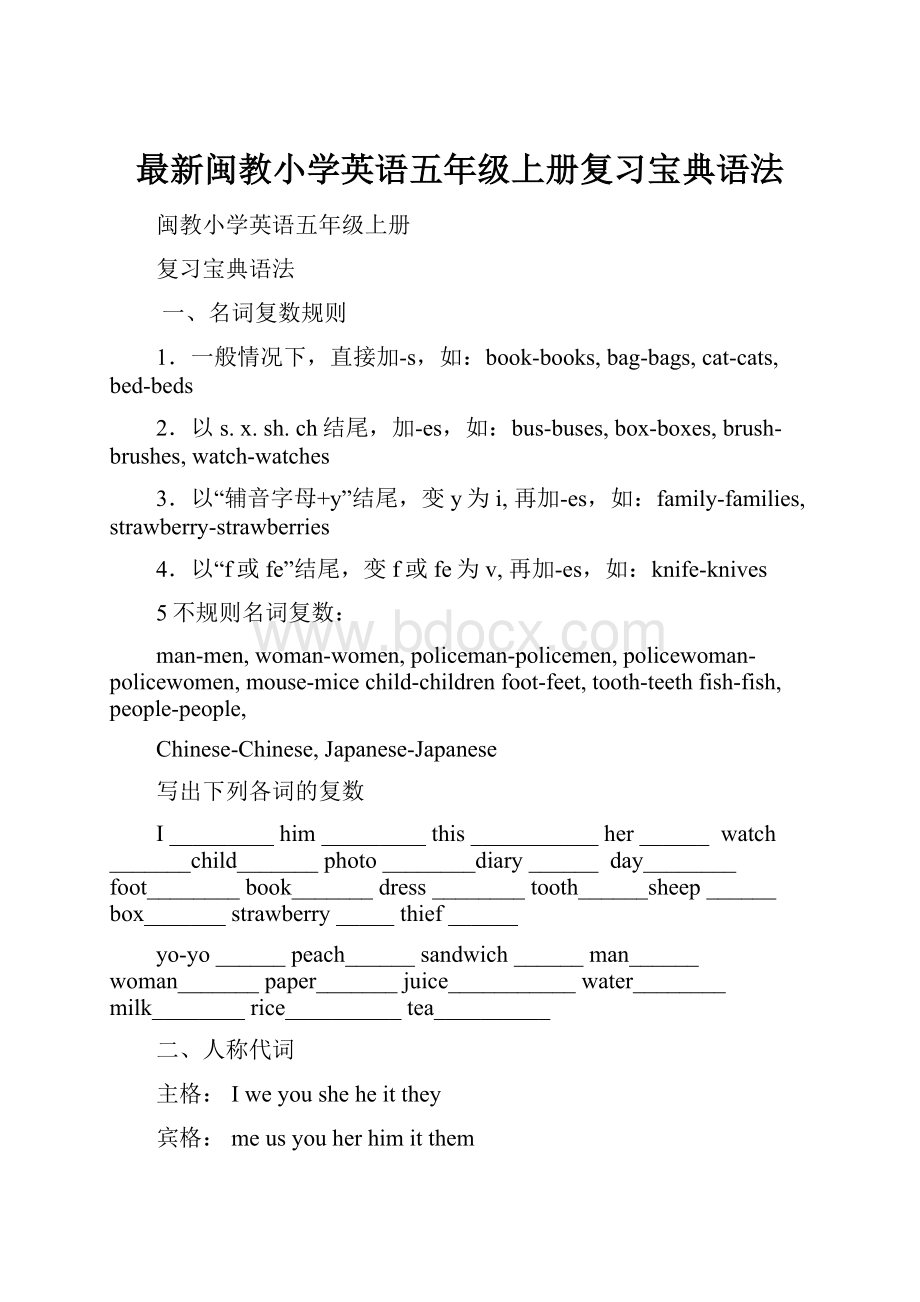最新闽教小学英语五年级上册复习宝典语法.docx
《最新闽教小学英语五年级上册复习宝典语法.docx》由会员分享,可在线阅读,更多相关《最新闽教小学英语五年级上册复习宝典语法.docx(14页珍藏版)》请在冰豆网上搜索。

最新闽教小学英语五年级上册复习宝典语法
闽教小学英语五年级上册
复习宝典语法
一、名词复数规则
1.一般情况下,直接加-s,如:
book-books,bag-bags,cat-cats,bed-beds
2.以s.x.sh.ch结尾,加-es,如:
bus-buses,box-boxes,brush-brushes,watch-watches
3.以“辅音字母+y”结尾,变y为i,再加-es,如:
family-families,strawberry-strawberries
4.以“f或fe”结尾,变f或fe为v,再加-es,如:
knife-knives
5不规则名词复数:
man-men,woman-women,policeman-policemen,policewoman-policewomen,mouse-micechild-childrenfoot-feet,tooth-teethfish-fish,people-people,
Chinese-Chinese,Japanese-Japanese
写出下列各词的复数
I_________him_________this___________her______watch_______child_______photo________diary______day________foot________book_______dress________tooth______sheep______box_______strawberry_____thief______
yo-yo______peach______sandwich______man______woman_______paper_______juice___________water________milk________rice__________tea__________
二、人称代词
主格:
Iweyousheheitthey
宾格:
meusyouherhimitthem
形容词性物主代词myouryourherhisitstheir
名词性物主代词:
mineoursyourshershisitstheirs
三、可数词和不可数名词的复数形式
可数名词:
可数名词+s如:
abook–books
名词后有+y,去y+ies如:
astory—stories
名词后有s,sh,ch、x,就直接+es如:
aglass—glassesawatch-watches
名词后有o+s或者+es如:
apiano—pianosamango—mangoes
-for-fe-forfe+vesaknife–knivesashelf-shelves
不可数名词(单复数形式不变)bread,rice,water,juiceetc.
四.缩略形式I’m=Iamyou’re=youareshe’s=sheishe’s=heist’s=itiswho’s=whoiscan’t=cannotisn’t=isnot
五、a/anabook,apeachanegganhour
六、介词方位:
on,in,infrontof,between,nextto,near,beside,at,behind.表示时间:
atsixo’clock,atChristmas,atbreakfast
onMondayon15thJulyOnNationalDay
intheeveninginDecemberinwinter
七、be动词
(1)现在式:
I+am/
you或复数名词(如books„)+are/
he、she、it及单数名词+is
现在式的肯定否定句:
am(not)are(not)is(not)
2、过去式:
was(not)were(not)was(not)
3、一般疑问句:
AmIaChnese?
Yes,youare.No,youaren’t.
AretheyAmerican?
Yes,.theyare.No,theyaren’t.
Isthecatfat?
Yes,itis.No,itisn’t.
八、一般现在时。
通常用“usually,often,everyday,sometimes”。
肯定句:
Igotoschoolonfooteveryday.Shegoestoschoolonfooteveryday.
一般疑问句:
Doyoujumphigh?
Yes,Ido./No,Idon’t.Doeshejumphigh?
Yes,hedoes./No,hedoesn’t.
否定句:
Wedon’tgotoschoolonSundays.Mymotherdoesn’tlikewatchingTVintheevening.
一般现在时基本用法介绍
【No.1】一般现在时的功能
1.表示事物或人物的特征、状态。
如:
Theskyisblue.天空是蓝色的。
2.表示经常性或习惯性的动作。
如:
Igetupatsixeveryday.我每天六点起床。
3.表示客观现实。
如:
Theearthgoesaroundthesun.地球绕着太阳转。
一般现在时的构成
1.be动词:
主语+be(am,is,are)+其它。
如:
Iamaboy.我是一个男孩。
2.行为动词:
主语+行为动词(+其它)。
如:
WestudyEnglish.我们学习英语。
当主语为第三人称单数(he,she,it)时,要在动词后加"-s"或"-es"。
如:
MarylikesChinese.玛丽喜欢汉语。
一般现在时的变化
1.be动词的变化。
否定句:
主语+be+not+其它。
如:
Heisnotaworker.他不是工人。
一般疑问句:
Be+主语+其它。
如:
-Areyouastudent?
-Yes.Iam./No,I'mnot.
特殊疑问句:
疑问词+一般疑问句。
如:
Whereismybike?
2.行为动词的变化。
否定句:
主语+don't(doesn't)+动词原形(+其它)。
如:
Idon'tlikebread.
当主语为第三人称单数时,要用doesn't构成否定句。
如:
Hedoesn'toftenplay.
一般疑问句:
Do(Does)+主语+动词原形+其它。
如:
-Doyouoftenplayfootball?
-Yes,Ido./No,Idon't.
当主语为第三人称单数时,要用does构成一般疑问句。
如:
-Doesshegotoworkbybike?
-Yes,shedoes./No,shedoesn't.
特殊疑问句:
疑问词+一般疑问句。
如:
Howdoesyourfathergotowork?
动词+s的变化规则
1.一般情况下,直接加-s,如:
cook-cooks,milk-milks
2.以s.x.sh.ch.o结尾,加-es,如:
guess-guesses,wash-washes,watch-watches,go-goes
3.以“辅音字母+y”结尾,变y为i,再加-es,如:
study-studies
一般现在时用法专练:
一、写出下列动词的第三人称单数
drink________go_______stay________make________
look_________have_______pass_______carry____come________watch______plant_______fly________study_______brush________do_________teach_______
二、用括号内动词的适当形式填空。
1.Heoften________(have)dinnerathome.
2.DanielandTommy_______(be)inClassOne.
3.We_______(notwatch)TVonMonday.
4.Nick_______(notgo)tothezooonSunday.
5.______they________(like)theWorldCup?
6.What_______theyoften_______(do)onSaturdays?
7._______yourparents_______(read)newspaperseveryday?
8.Thegirl_______(teach)usEnglishonSundays.
9.SheandI________(take)awalktogethereveryevening.
10.There________(be)somewaterinthebottle.
11.Mike_______(like)cooking.
12.They_______(have)thesamehobby.
13.Myaunt_______(look)afterherbabycarefully.
14.Youalways_______(do)yourhomeworkwell.
15.I_______(be)ill.I’mstayinginbed.
16.She_______(go)toschoolfromMondaytoFriday.
17.LiuTao_______(do)notlikePE.
18.Thechildoften_______(watch)TVintheevening.
19.SuHaiandSuYang_______(have)eightlessonsthisterm.
20.-Whatday_______(be)ittoday?
-It’sSaturday.
三、按照要求改写句子
1.DanielwatchesTVeveryevening.(改为否定句)___________________________________________________
2.Idomyhomeworkeveryday.(改为一般疑问句,作否定回答)
________________________________________________________
3.Shelikesmilk.(改为一般疑问句,作肯定回答)___________________________
4.Amylikesplayingcomputergames.(改为一般疑问句,作否定回答)___________________________________________________
5.Wegotoschooleverymorning.(改为否定句)_______________________________________________________
6.HespeaksEnglishverywell.(改为否定句)___________________________________________________
7.Iliketakingphotosinthepark.(对划线部分提问)________________________________________________________
8.JohncomesfromCanada.(对划线部分提问)___________________________________________________
9.Sheisalwaysagoodstudent.(改为一般疑问句,作否定回答)________________________________________________________
10.SimonandDaniellikegoingskating.(改为否定句)___________________________________________________
五、改错(划出错误的地方,将正确的写在横线上)
1.IsyourbrotherspeakEnglish?
__________________
2.Doeshelikesgoingfishing?
__________________
3.Helikesplaygamesafterclass.__________________
4.Mr.WuteachsusEnglish.__________________
5.Shedon’tdoherhomeworkonSundays._________________
十、一般过去时
I.一般过去时表示过去某个时间发生动作或存在状态。
常和表示过去时间状语连用。
如:
lastyear,lastweek/justnow/yesterday等;
也可表示过去经常反复发生动作,常和often,always等频率副词连用。
例如:
①Isawhiminthestreetyesterday.昨天我在街上看见他了。
②LiMeialwayswenttoschoolonfootlastyear.去年李梅总是步行上学。
II.一般过去时构成
我们主要来学习谓语动词为实义动词一般过去时构成。
动词过去式构成:
(1)规则动词过去式构成有四条规则:
①一般在动词原形末尾直接加上-ed。
如:
look-looked。
②以不发音字母e结尾动词,去e再加-ed。
如:
live-lived。
③末尾只有一个辅音字母重读闭音节,先双写这个辅音字母,再加-ed。
如:
stop-stopped。
④末尾是辅音字母+y结尾动词,先变y为i,然后再加-ed。
如:
study-studied。
(2)不规则动词过去式需特殊记忆。
如:
am(is)-was,are-were,go-went,come-came,take-took,have(has)-had等。
III.一般过去时几种句型
肯定句结构为:
主语+动词过去式+其它。
如:
Hewenttothetoystoreyesterday.他昨天去玩具店了。
否定句结构为:
主语+didnot(didn't)+动词原形+其它。
如:
Hedidn'tgotothetoystoreyesterday.他昨天没去玩具店。
一般过去时一般疑问句构成:
Did+主语+动词原形+其它?
如:
1)-DidyougotoBeijinglastweek?
-Yes,wedid.(No,wedidn't.)
2)-Didyoumeetthebusinessmanbefore?
-No,Ididn't.(Yes,Idid.)
一般过去时特殊疑问句构成:
疑问词+did+主语+动词原形+其它?
如:
1)-Whatdidyoudolastnight?
-Ididmyhomework.
2)-Wheredidyougolastweek?
-IwenttoShanghaiwithmyparents.
一般过去时口诀
一般过去时并不难,表示过去动作、状态记心间。
动词要用过去式,时间状语句末站。
否定句很简单,didn't站在动词原形前,其它部分不要变。
一般疑问句也好变,did放在句子前,主语、动词原形、其它部分依次站。
特殊疑问句也简单,疑问词加一般疑问句记心间。
最后一条请注意,动词过去式要牢记。
一般过去时的练习
I.用所给的动词的适当形式填空。
⒈He___________(visit)theGreatWalllastyear.
2.We____________(have)agoodtimeyesterday.
3.Weoften__________(go)toschoolbybuslastyear.
4.I__________(live)inthevillagewhenIwasachild.
5.Mike__________(see)abigtigerinthenatureparklastyear.
6.Sam___________(do)thehouseworkyesterday.
7.________(do)you_________(enjoy)yourselfyesterday?
8.________(do)you__________(play)theviolinintheafternoonyesterday?
No,Ididn't.I___________(draw)somepicturesthere.
9.I__________(eat)abigpizzayesterday.
10.There_________(be)manysheeponthefarmlastyear.
11.I_________(watch)acartoononSaturday.
12.Herfather__________(read)anewspaperlastnight.
13.We_________tozooyesterday,we___________tothepark.(go)
14._________you__________(visit)yourrelativeslastSpringFestival?
15._______he__________(fly)akiteonSunday?
Yes,he__________.
II.选择填空
1.Shewateredtheflowers________.
AtomorrowBsometimesCyesterdaymorning
2.What____Mikedolastweekend?
AdoBdoesCdid
3.I___myroomlastSunday.
AcleanedBcleanCamcleaning
句型总汇
1.Wereyouinthesupermarket/bookstore/fruitstore/toystore/parkjustnow?
(刚才你在超市/书店/水果店/玩具店/公园吗?
)
Yes,Iwas./No,Iwasn’t.
2.Wheredidyougoyesterday?
(昨天你去了哪里?
)
3.Iwenttothesupermarket/bookstore/fruitstore/toystore/park.(我去了超市/书店/水果店/玩具店/公园。
)
4.Iboughtaschoolbag/apencil-case/aruler.(我买了一个书包/铅笔盒/一把尺子。
)
5.Didyouhaveagoodtime?
(你过得开心吗?
)Yes,Idid./No,Ididn’t.
6.IvisitedBigBen/theGreatWall.(我参观了大本钟/长城。
)
Ihadagoodtime.(我过得很开心。
)
7.Weplayedbasketball/thepiano.(我们打了篮球/弹了钢琴。
)
Ididmyhomework.(我做了作业。
)
Itooksomephotosofthepenguins.(我拍了一些企鹅的照片。
)
Iswaminthesea.(我在海里游泳。
)
8.Whereareyou/ishe/aretheyfrom?
I’m/He’s/They’refromChina/Australia/England/theUSA.(我/他/他们来自中国/澳大利亚/英国/美国。
)
9.Wesawpandas/kangaroos/penguins.(我们看到了熊猫/袋鼠/企鹅。
)
Weatesomebananasonourwayhome.(我们在回家的路上吃了一些香蕉。
)
10.(电话用语)Hello.ThisisSally(speaking).(我是Sally。
)
MayIspeaktoPeter?
(我可以找Peter接电话吗?
)
Speaking.(请讲。
)
Holdon,please.(请别挂线。
)
It’sfromSally.(Sally打来的。
)
11.It’sMid-AutumnDaytomorrow.(明天是中秋节。
)
ItwasMid-AutumnDayyesterday.(昨天是中秋节。
)
12.(问路)Excuseme,Sir/Madam.
Whereisthezoo/park/bank/library/trainstation/busstop?
(动物园/公园/银行/图书馆/火车站/公共汽车停靠站在哪里?
)
HowcanIgettothezoo/park/bank/library/trainstation/busstop?
(我怎样才能到动物园/公园/银行/图书馆/火车站/公共汽车停靠站)
Turnleft/right.(向左/右转。
)
Gostraight.(一直向前走。
)
It’sontheleft/right.(它在左/右边。
)
It’sfaraway.(很远。
)
Youcantakeabus.(你可以搭公